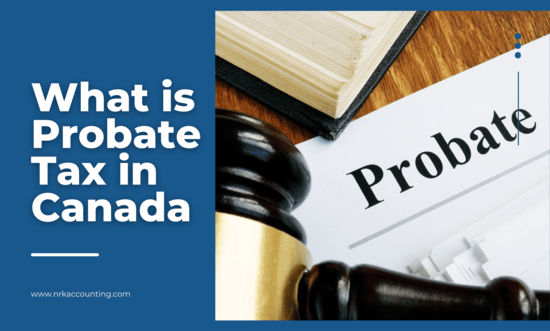What is Probate Tax in Canada? Simplifying the Complex for Beneficiaries
Diving into the world of probate tax in Canada can feel like navigating a labyrinth in the dark. Ever wonder why settling an estate feels more complex than it should be? This isn’t just a legal puzzle; it’s a crucial step in honoring a loved one’s legacy, potentially affecting your financial future. But fear not, we’re here to light the way, simplifying the complexities of probate tax for beneficiaries like you.
In this article, we’ll cover:
- The basics of probate tax in Canada
- How it impacts your inheritance
If the thought of crunching numbers and legal jargon sends shivers down your spine, you’re not alone. That’s where NRK Accounting steps in. With over 20 years of experience, our tax professionals in Toronto specialize in untangling the complex web of accounting and tax services for individuals and businesses. Let’s make this journey a smooth one, together.
The Basics of Probate Tax in Canada
Navigating the end-of-life legalities in Canada introduces you to the probate process—a critical step in validating a will and legitimizing the executor’s role. Here’s a breakdown to make this complex subject a bit more digestible:
- Probate Tax, Explained: At its core, probate tax, or estate administration tax, is what the estate owes before assets make their way to beneficiaries. Think of it as the cost of ensuring everything is above board.
- How It Hits Your Wallet: The amount varies across provinces. For example, Ontario gives you a break on the first $50,000, charging 1.5% on the remainder. Alberta, on the other hand, opts for a flat fee structure, scaling from $35 to $525 based on the estate’s value.
Navigating Probate Fees
Understanding probate fees is more than a legal obligation—it’s a strategy to preserve your estate’s value for your loved ones. Here’s the lowdown:
- Inventory Your Assets: We’re talking real estate, investments, even the family car. Knowing what’s in the estate is step one.
- Know What’s Exempt: Some assets dodge the probate bullet, like jointly owned property or certain insurance policies. This knowledge can save your estate a bundle.
A Word from NRK Accounting
Tackling probate tax isn’t just about dotting i’s and crossing t’s. It’s about ensuring your legacy thrives. At NRK Accounting, we don’t just crunch numbers; we strategize, ensuring your estate planning is bulletproof. With over two decades of expertise, we’re here to guide you through every twist and turn of the probate process, ensuring a seamless transition for your beneficiaries.
Probate tax is a non-negotiable in estate planning, but with the right approach (and a little help from pros like us at NRK Accounting), navigating these waters can be less daunting. Let’s ensure your legacy is not just preserved but cherished.
How Probate Tax Impacts Your Inheritance
When a loved one passes away, navigating the maze of legal and financial responsibilities can be daunting. One crucial aspect that often catches beneficiaries off guard is the probate tax and its effect on inheritance. Let’s unpack this:
Probate Tax: A Slice of Your Inheritance Pie
- Reduced Estate Value: Probate tax is calculated based on the total value of the deceased’s estate. The higher the estate value, the more tax owed, directly reducing the amount available for distribution to beneficiaries.
- The Provincial Patchwork: The impact varies significantly across provinces due to differing probate tax rates. For instance, Ontario’s approach with a flat 1.5% tax rate on estates over $50,000 contrasts sharply with Alberta’s sliding fee scale, potentially altering the inheritance landscape based on geographical location.
Understanding the Ripple Effect
- Asset Delays: Probate can temporarily freeze estate assets, delaying when beneficiaries can access their inheritance. This period can stretch from several months to over a year, depending on the estate’s complexity and provincial backlog.
- Costs Beyond Tax: Aside from probate tax, additional costs, including legal, executor, and appraisal fees, can further diminish the estate’s value. Each of these must be paid out before assets are distributed, adding layers of financial burden on the estate.
Strategies to Shield Your Inheritance
- Joint Ownership: Assets owned jointly with a right of survivorship pass directly to the co-owner, sidestepping the probate process entirely.
- Designated Beneficiaries: Life insurance policies, RRSPs, TFSAs, and RRIFs with a named beneficiary (other than the estate) are not subject to probate, offering a straightforward path to transfer wealth.
Probate tax can take a notable bite out of your inheritance, but with strategic planning and expert guidance from NRK Accounting, you can navigate these challenges effectively. Protecting your inheritance from probate’s reach is about making savvy decisions now, for peace of mind later.
Estate Planning: Navigating Probate Tax with NRK Accounting
Wrapping up, you’ve now navigated the complex waters of probate tax in Canada and its impact on your inheritance. Armed with this knowledge, you’re better prepared to protect your legacy and ensure your loved ones benefit fully from your life’s work.
Key Takeaways:
- Probate tax varies by province, affecting your inheritance’s value.
- Joint ownership and designated beneficiaries can shield assets from probate.
- Additional costs and delays are part of the probate process.
- Strategic planning can minimize the probate tax impact.
In a world where financial foresight can make all the difference, NRK Accounting stands as your beacon through the fog of estate planning and probate tax. With a legacy of over 20 years in tax and accounting expertise, we’re more than just number crunchers—we’re your partners in securing a prosperous future for your heirs. Let’s honor your legacy together, ensuring your final wishes are fulfilled exactly as you envisioned.

